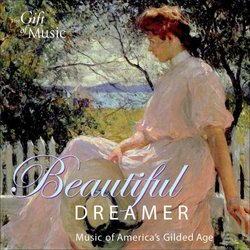| All Artists: Cincinatti Pops Orchestra;Martin Souter;Sara Stowe Title: Beautiful Dreamer Members Wishing: 0 Total Copies: 0 Label: The Gift of Music Release Date: 3/4/2005 Genres: Jazz, Special Interest, Classical Styles: Swing Jazz, Marches, Opera & Classical Vocal, Symphonies Number of Discs: 1 SwapaCD Credits: 1 UPC: 658592113822 |
Search - Cincinatti Pops Orchestra;Martin Souter;Sara Stowe :: Beautiful Dreamer
 | Cincinatti Pops Orchestra;Martin Souter;Sara Stowe Beautiful Dreamer Genres: Jazz, Special Interest, Classical
Beautiful Dreamer Music of America's Gilded Age Music from America's brilliant period, from the end of the Civil War to the second decade of the 1900s, reflected in an album of piano music and songs. Edward MacDowell and o... more » |
Larger Image |
CD Details
Synopsis
Product Description
Beautiful Dreamer Music of America's Gilded Age Music from America's brilliant period, from the end of the Civil War to the second decade of the 1900s, reflected in an album of piano music and songs. Edward MacDowell and others wrote music of great beauty and refinement: and there are songs from Stephen Foster, and early Ragtime too, in the works of Joplin and others. The great writer and humorist Mark Twain coined the term 'The Gilded Age'. It is used to describe the opulence of certain parts of American society from the period from the end of the American Civil War to around the beginning of the First World War. This was the time of the 'robber barons', a group of families who had acquired immense wealth through industrialisation, the growth of the railroads and the rise of the stock market. Mark Twain was a careful and blunt commentator on the changes which he saw in American society in this period. In 1871 he asked and answered a few questions: "What is the chief end of man? - to get rich. In what way? - dishonestly if we can; honestly if we must." And while many got rich, a huge proportion of the population remained desperately poor. Everybody had the opportunity to become a Carnegie, a Vanderbilt or a Rockefeller, but, in reality, only a few were able to do so. But the wealth of those few had a huge impact on the music of America, since they were in a position to become patrons of the arts, and to found institutions such as the Metropolitan Opera House in New York and the Metropolitan Museum of Art. This album brings together contrasting music from the Gilded Age with a musical portrait of Twain himself from one of the greatest melodists of early twentieth century America. The earliest music represented here is in songs by Stephen Foster. Beautiful Dreamer dates from 1862 and Old Folks at Home from 1851. They were composed right at the start of the Gilded Age, but their fame spread quickly, and they remained in vogue for decades. Foster's self-declared aim was to 'build up taste among refined people by making words suitable to their taste, instead of the trashy and really offensive words which belong to some songs.' Even today, Foster's superbly-crafted melodies are familiar to Americans and Europeans alike.

 Track Listings (13) - Disc #1
Track Listings (13) - Disc #1